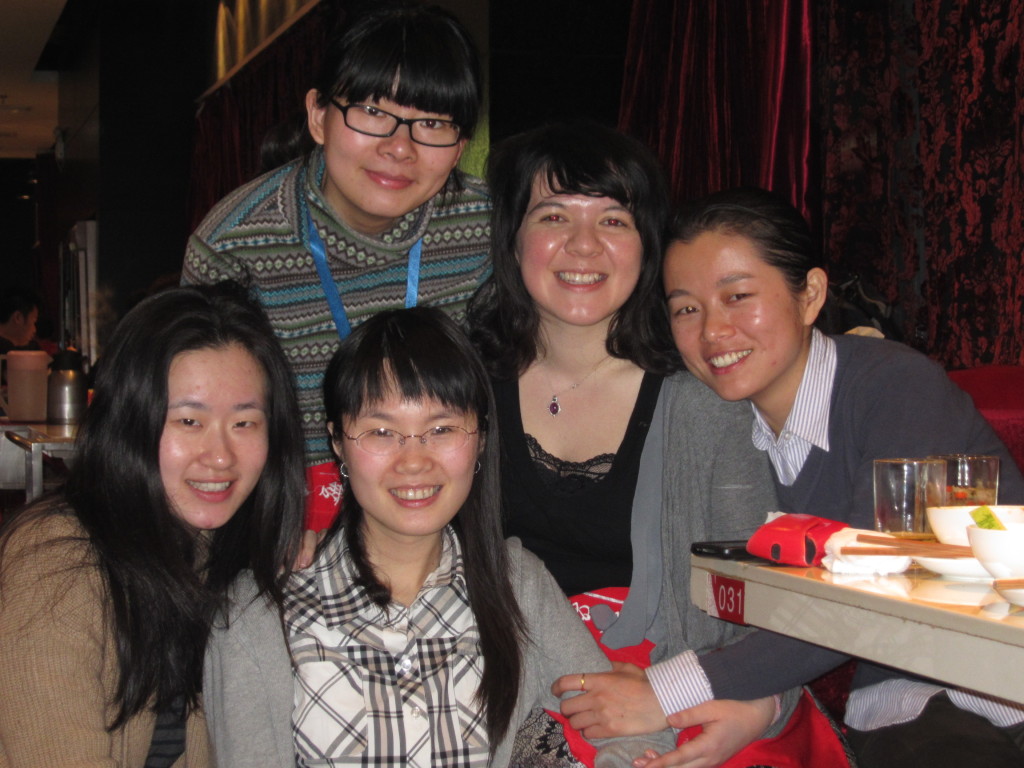How I Learned to Speak Mandarin in 6 Months
This isn’t a post about how great I am at languages. I’m not like some jerk on the internet claiming to achieve fluency in three months.
This is a post about the blood, sweat and tears I spent to learn Chinese.
I never thought I would learn how to speak Chinese: The tones, the characters, and the proverbs were frustrating. The task of learning Mandarin was daunting and overwhelming–and honestly, there were many moments I thought I was just not meant to learn this language.
Yet somehow, I did it. I learned Chinese in less than a year.
I believe with dedication, hard work and these seven steps, anyone can learn any language in six months.
Step 1. Move to China (for six months at least)
Yup. Pack your bags and go.
Undoubtedly, this is the most vital step.
For some, the first step may seem both emotionally and financially impossible–but trust me, if poor Mary from Utah can do it, anyone can.
I’m sure you could learn Chinese in your home country, but it would take you twice as long. Being in China not only gives you complete immersion, but it also puts your textbook smarts to use in real life situations.
And with China practically handing you money to study Chinese, there is no reason not to give it your best and move to China.
Step 2. Enroll in a Chinese Learning Program
I’m not rich. I don’t have rich parents and I definitely didn’t have a sugar daddy to pay for my tuition. I learned Chinese in six months because I had to—I didn’t have enough money to stay longer (honestly, a year would have been nice!).
But in my opinion, six consecutive hours of Chinese class everyday, from a trained professional, is worth the money.
On the bright side, China is (comparatively) cheap. Although I never had the joy of studying abroad in Japan due to exorbitant costs, China helped me realize my dreams of overseas learning through its affordable tuition and room and board.
As of today, tuition for 5 months of Chinese language study at China’s #1 rated university, Tsinghua University, is 12,000 RMB (2,000 USD) with a single dorm (a/c, internet/cable included) costing you 13 USD a day. For 5 months at Tsinghua, tuition and housing included, you can learn Chinese at the best University in China for less than 5,000 USD a semester (way, way cheaper than Japan).
Plus, I’m more than confident you can get a scholarship.
Step 3. No Partying

Instead of hit the club with your foreign friends after class, hit your textbooks or see a Chinese movie in theaters with the locals. It’s going to be difficult exhausting restraint and making the books over booze decision, but unfortunately getting drunk all night and being hungover during class doesn’t equal to fluency.
No doesn’t mean never—just keep partying to a minimum. Instead, use that well saved party money to…
Step 4. Get a tutor

My tutor’s name was Danny and he was a hardass. He schooled me. He smacked me senseless with a notebook on day one and said he could barely understand the words coming out of my mouth, Chris Tucker style. I sobbed. He called me a wimp. I stuttered when I spoke and my tones were all wrong, but Danny would have none of it. Fix that sorry excuse you call Chinese, he demanded, and made me write five page essays on current events for homework (everyday).
It wasn’t until our last day of lessons, after I talked for a full 30 minutes in Chinese about my future plans concluding Tsinghua University and Beijing, that Danny smiled at me and said:
“Compare the Chinese you’re speaking now to day one. You should be proud of yourself.”
Step 5. Get a Language Partner (or 3)
If I wasn’t meeting my tutor or in class, I was with one of my three language partners.
I posted want ads around the school. I looked online and met countless weirdos. I don’t want to be your friend, I told them up front, I want to practice Chinese for 30 minutes and teach you English the other 30. Don’t go off topic. Don’t try to get buddy buddy with me.
In the end, I weeded out three wonderful people (that, despite my initial wishes, became my very good friends).
I’ll never forget their words of encouragement. I think in me they saw a passion to learn their language, and in that they took great pride. Without their continual support and guidance, I wouldn’t have made it to the 6 month mark.
Step 6. Watch Chinese Movies and TV

I know. Chinese movies and TV aren’t the greatest–but just grin and bear it. Try your best to watch modern TV and movies (no ancient dynasty concubine drama), and do it WITHOUT ENGLISH SUBTITLES. This is key. (Chinese subtitles are OK).
I like to watch Fei Cheng Wu Rao (you are the only one), a dating show, since it’s fairly easy to understand and somewhat entertaining. You can watch the latest episodes, online, here at Tudou.
Yueni, an amazing Chinese translator and interpreter, also posted some great reads, movies and TV shows for Chinese practice. Check it out!
Step 7. Study in Beijing
Like I explained earlier, not everyone in China speaks Chinese.
So, studying Chinese in a place where Mandarin isn’t widely spoken (ahem, Shanghai) might actually be a hindrance to your study. I am eternally grateful that I chose Beijing to study Chinese. It’s the perfect place to learn ‘proper’ Chinese and will give you a beautiful Beijing accent.
And Finally, Don’t Give Up

There are so many times I thought about quitting Chinese. I remember one day I forgot how to write the Chinese character for chair after hours of practice–and I went mental. I broke down in tears, sobbed, and wondered why on Earth I spent so much time writing squiggly lines.
But believe me, the perseverance paid off.
Even if step one of my advice is not possible at the moment (dropping everything and moving to China is probably not very convenient for everyone), practicing the remaining six steps will set you well on your way to proper language learning.
Learning a foreign language is by no means easy, but the process of learning Mandarin (or any language!) and achieving fluency will, without a doubt, change your life.
Because that’s what living abroad does: Change you. My experiences in Beijing are what ultimately led me back to China and to Shanghai, and have made me who I am today.
Do you have any other language learning tips that helped you learn Chinese or another language?
*disclaimer: I did learn Japanese before Chinese, so I didn’t have to learn the horrifically difficult Chinese characters from scratch (but trust me, the similarities between the languages end there).






44 thoughts on “How I Learned to Speak Mandarin in 6 Months”
Six months? Really? You are 真牛! I’m going on nine years and I live with two Chinese speakers (and we use Chinese, about half of the time). I’m nowhere close to what I would call fluent. How do you define fluency??? Of course, I haven’t done all your suggestions, which are good ones, for nine years. But I have done them all for various amounts of time.
Not to be a jerk, but how is claiming six months to gain fluency really less gimmicky than claiming three? They are both incredibly short periods of time to learn a language well. Think of how long it takes us to learn our native tongue!
Its my understanding that the accent in Beijing is not standard. I agree that it is one of the better places to learn Chinese, but the 儿话 is something one should work hard to avoid–an accent that will have you sounding like a pirate!
You are very correct with your comments there, and I have changed my post accordingly. I was hesitant to post this because I didn’t want to seem like I was bragging, but I wanted to let people know it was possible to learn a language in less than a year. Fluency is hard to define (I think of it as being able to read/write/have a conversation without stuttering), so when I say I was ‘fluent’ after six months, I meant I was able to talk about semi difficult topics in Chinese without falter and I could probably understand 60-70% of the language around me. I was able to speak half decently after six months (like, maybe middle school level for a typical Chinese student), but I still have a long way to go.
I think to learn a language in a short amount of time, you have to dedicate EVERYTHING to it. So, during that six months, I did nothing but study Chinese. I woke up, went to Chinese class, met my tutor after class, met my language partners after my tutor and then I watched TV before bed–and I repeated that for six months. I literally did nothing else.
My Chinese actually slipped in Shanghai, because I had a job and other responsibilities and I couldn’t focus 100% of my time on Chinese. So (like most things) I think learning a difficult skill (esp Chinese) takes sheer determination.
Also, it took me six years to speak Japanese at a level I would consider ‘fluent.’ I heard the second language is ‘easier’ to pick up, so this may have had an impression as well.
Beijing er-hua is pretty nasty, haha, but I think it’s better to be surrounded by that than a dialect like Shanghai-hua that is nothing like Mandarin.
Thanks for your comment and I’m sorry if I was offensive! My Chinese is actually slipping here in the states, so I might have to do some of these steps myself. Still, I remember picking up Chinese quickly with my intense regiment up there, and I hope I will have a chance to do this again.
Not offensive! I guess I think there is a fine line between being encouraging and overly optimistic. Studying a new language can take a long time. Sometimes when people talk about how quickly they picked up Mandarin (or anything, for the matter) I start to wonder what’s wrong with me. Why can’t I learn things faster? But everyone is different in their study habits, goals, and amount of free time. I do believe some people have an inborn talent for certain things too.
So you learned Japanese first? Do you think knowing kanji gave you a leg up on learning Chinese? I think wrapping my head around characters took quite some time. I know some people who don’t even both learning them, but I find it to be one of the most interesting aspects of studying Chinese.
To be honest I think knowing Japanese first helped cut my learning time in half. Although the readings are completely different, the meanings for the Chinese characters are completely the same so I didn’t have to start from scratch (and I know writing those characters over and over again can get old, FAST). When I studied Japanese I spent HOURS writing character after character, because there is no easy way to learn characters. It’s just a pain in the ass.
So yes, Japanese helped a lot and I will admit–it was a form of cheating!! I actually think speaking Chinese isn’t too bad (although understanding it can be quite difficult!). The grammar isn’t too complicated, just getting the tones down is the hard part.
I met tons of Japanese coworkers that spent years trying to learn Chinese, but since they had to work and had other responsibilities it was difficult to actually sit down and study Chinese. Even if you’re thrown into the environment, if you don’t’ have time to just focus solely on language learning, you’ll forget it all. Plus, when you’re tired after a full day of work the last thing you want to do is pick up a Chinese book, right? (at least, that’s how I feel now with my full time job haha)
My time in Beijing was also the only time in my life I was able to focus solely on studying–and sometimes, I like to call this the “happiest” time of my life. I didn’t have to worry about paying the bills, or climbing the career ladder, or landing a good job.. all I had to do was study Chinese! (and I love Chinese, so I was in heaven). In university I worked part time jobs to pay for my rent and tuition and it was a pretty rough life, so my hardcore 6 month Chinese training was more like a vacation and a way to learn about China. Although it was a lot of work, I really enjoyed it. Even today, I’m truly grateful I had just six months to do whatever I wanted (which happened to be learning Chinese).
Anyway, you’re fine! Even though I “learned” chinese in six months, I still feel like I have a long way to go. Language learning is never ending, and we’re always learning 🙂
Mary, you are amazing! I also got to be fluent in Chinese but it took me like 2 years in Beijing to feel that I was indeed fluent. I wasn’t so hardcore as you; I did study for over 5 hours every day the first month (plus daily lessons), but then I took it easy. And well, I had studied previously for 4 years in Spain… but when I arrived to Beijing I could hardly utter a word.
I still think my tones are sometimes awful, BTW.
I also liked A world without thieves! Have you watched 李米的猜想? (Totally unrelated but it is another movie I liked, haha).
Haha I’m not amazing, I think learning Japanese was a big cheater shortcut (and that took me six years!). I was pretty hardcore in Beijing and I honestly don’t know how–maybe it was all the adrenaline of living in a new, foreign country. I’m trying to learn Italian now and believe me, it’s going to take 6 years not 6 months, haha. Living in the country helps SO much.
My tones are bad, too. My Chinese friends are always correcting me.
I haven’t watched 李米的猜想!!! Yes!!! New good Chinese movie to watch!!! Any other recommends?
Did you watch the last Zhang Yimou? (Coming home). It reminds me of his first movies (Ju Dou and Raise the red lantern are not to be missed if you haven’t watched them!).
Any movie you can recommend me? 😀 I haven’t watched anything too exciting lately.
No I haven’t seen that one because Zhang Yimou’s film quality started to go down… but I trust you, let me check that one out!
I really liked Let the Bullets Fly (I’m sure you’ve seen this one, haha) and all of Feng Xiaogang’s movies are really good (even though I heard he’s kind of a jerk in person). I like his movies Fei Cheng Wu Rao and there’s one about a funeral… really nice.
And I loooove Takeshi Kaneshiro (in my book, he’s the sexiest man alive haha). He was in a movie with Donnie Yen called “Wu Xia,” people gave this movie a lot of bad reviews but I thought it was pretty good (only the ending sucks).
And finally, although it’s not Mandarin, I LOOOOOOVE Stephen Chow movies, such as Shaolin Soccer, Kung Fu Hustle, etc.. all of his movies are simply hilarious. He’s actually one of the reasons I started studying Chinese. I think you can watch a dub of these movies in Mandarin (that’s what most mainland people do), but I like watching the original Cantonese… sounds funny, ahaha
Oh, Takeshi Kaneshiro is definitely hot, haha. But I haven’t watched many of his movies! My platonic love is Tony Leung, even though he’s old he has this gentleman something and I love it *^_^* (In the mood for love!!!!).
I haven’t watched Let the bullets fly! His new movie (Gone with the bullets, is it the second part or what??) is EVERYWHERE right now and I haven’t seen it either haha. But I will! I really liked Devils at the doorstep.
Haha, yes, Stephen Chow. His last movies have been quite bad though. I just saw he’s filming Kung Fu Hustle 2!!! That should be fun.
And regarding Zhang Yimou, even though some of this last movies have been too grandiloquent and totally out of the place I still watch them… they are usually visually stunning. Even the one about the noodle shop in the desert in Gansu, the story was kind of stupid but the images were so beautiful!
Oh have you watched Comrades, almost a love story? It is so beautiful! And with the songs of Teresa Teng, haha.
It is inspiring to know that a language can be learned within such a short time. I’ve never formally studied Chinese in China though I’ve lived here for a while. At this point I can speak and read enough to give people crap when they try to overcharge me in the morning market. I should learn more but I don’t think I have it in me, with the kid and the Tibetan husband, I think I need to focus more on Tibetan. Hopefully what you said about learning a second second language is true 🙂
Yeah, it is possible! But I think a lot of people want a short, easy way to learn Chinese–and unfortunately, it just doesn’t exist. It takes a lot of hard work.
Luckily when I went to Beijing I was (sort of) single and I didn’t have to worry about anything other than language. It was super refreshing and it was one of the happiest moments of my life (like most Americans, I had tons of part time jobs in college to pay the bills!).
Wow Tibetan is SO amazing!!!! I read your blog post and I still remember toe! (floor!) I look forward to more of your Tibetan posts! 🙂
You are amazing, Mary! Seriously, from this post it is clear that you had one mission and one only and that was to learn Chinese. And it obviously paid off 🙂 I’ve been horrible about learning Thai lately. Hopefully after I get my big book project off my plate, I can pile it up with other goodness 🙂 Yes, I owe you an email. I haven’t forgotten, xxoo
Thai looks super hard–probably harder than Mandarin! I think I semi-cheated with Mandarin since I could already recognize most of the Chinese characters thanks to Japanese. Speaking is (surprisingly) not that hard–and Chinese grammar is easy. I know you could pick it up in no time.
Ooo what book project is this? I must read!!!
Thanks for the comment Lani!! 😀
Oh oh, really late to the party, but something I don’t think I mentioned in that comment, but my favourite Chinese documentary (thus far) is 舌尖上的中国. There’s English and Chinese versions on Youtube now. If you’re a foodie at all, I highly, highly recommend it.
I love that documentary, it’s a great way to learn about the real China! Plus the food is so amazing, oh man. I think some of the Chinese can be a little difficult for those that are first learning (since it has a lot of food terms), but still, very good!
I am so impressed. That is all.
This is really inspiring. I have been studying Chinese for probably almost a year now (but I work full time and it is SO hard to get the hours up). My fiance is Chinese but his English is perfect and he has little to no interest in teaching me Chinese. He and his parents can speak Mandarin but they speak Shanghai-hua to each other. I am planning to go to China next year but probably for a maximum of 3 months.
really nice sharing, highly appreciate your thread, Im now reading another post of yours, especially studying Japanese language, as currently im studying Chinese and plan to study Japanese language as well
Great! I’m glad you enjoyed the post. Let me know if you have any other questions about language learning
i didn’t find out the article about how u have studied japanese, or there isn’t ? if not I hope u can write down the experiences with that language. Your knowledge is very helpful to me
Wow thank you! That’s a great idea. I used a lot of the same principles in this article to learn Japanese, but since Japanese is a tad bit trickier maybe I could write up some tips. Thanks for the idea! I’ll get working on it.
lots of smog in that shang hai? pic…) Thats impressive you learned it that fast. Took me about the same to learn Japanese speaking/reading at the intermediate level. Was so naive and eager to learn it, went to 2 different schools.
Just being curious, but do you feel its worth it to learn Chinese just to live or work in China? Of course, if your a translator, there is a payout for your success. Im not a translator, and I put allot of effort into learning Japanese. Like allot of other foreigners, I rarely use it. The racism/xenophobia in Japan is sometimes thick and cringeworthy, so I dont want to be reminded of it or invite it. It seems once they know you speak Japanese, then the hook comes out and they try to own you or remind you of your position in their society. English alwasy trumps all of that so I play dumb. Is China the same? Hiearchical society? Foriegners at the bottom? Ive never got that vibe from Chinese people; just seems they are mostly about their own kind and making money. Do they also have the same “expel the barbarians” history that Japan does?
To be fair, learning Japanese took me 6 years or something ridiculous, so I’m thinking 1. Chinese is easier and 2. maybe the 2nd language comes a little quicker.
Everyone always asks me why I moved from Japan (a clean, well-mannered, organized and thoughtful country) to China (a corrupt, dirty, back-stabbing and cutthroat society) and my answer is this: Chinese people are real with you. Yeah there’s some racism and xenophobia but it doesn’t even come close to the levels of Japan. Chinese values mirror American values in the sense that: money wins. If you can make more money for your company, or you’re really good at what you do, Chinese companies are willing to invest in you even if you’re not Chinese.
I liked China because the people are friendly, open, and don’t focus so much on the foreigner aspect. Most Chinese people (although they do ogle at foreigners) tend to treat you as an equal. Chinese people actually respect foreigners that learn Chinese and, unlike the Japanese, aren’t patronizing about it. Not once in China did someone comment to me: “you use chopsticks so well.” Yeah, they would give me the “your Chinese is good comment,” but it wouldn’t be the first thing out of their mouths. In fact, some Chinese would even say: “yeah your Chinese is good but your tones are off and you can still get better.” Rude? Perhaps, but I much preferred this honesty to the crap I got in Japan.
So when I met my best Chinese friend (she worked at my company), I approached her in Chinese and asked her out to lunch. At the time my Mandarin wasn’t the greatest but it was ok enough, and we talked in Chinese all throughout the meal and we just talked about… normal stuff. Like work, and living in Shanghai, weekend plans.. she didn’t give me the foreigner treatment at all. It wasn’t until later I found out she was perfectly fluent in English (like, no accent), but still chose to speak to me in Chinese because she said a. she wanted to help my Chinese improve and b. for her, she preferred to speak Chinese. This would NEVER EVER HAPPEN IN JAPAN EVER.
Anyway, the reason I spent 5 years in China and only 2 years in Japan is because Chinese people are alive. They are talkative. They don’t make you feel like you ‘don’t belong.’ Although China is extremely frustrating (the no-manners thing and lack of education can be hard, especially after living in pristine Japan), the close friendships I got out of China were amazing. I felt more alive and happy in China than Japan, sad to say.
China is not for everyone, though. I would go there visit and see what you think. If the pollution/rude Chinese people/lack of infrastructure is simply unbearable, then it’s probably not a good fit.
I’m Chinese major student in china I were student of Addis Ababa University for 2 years, now I’m studying Chinese at TUTE Tianjin, China. I study Chinese 6 hours a day. I think studying just in class room is not enought to be a fluent speaker, so I get out and try to comunicate with chinese people, but the tianjin hua is really hard to understand, I don’t know what to do. I want to be good Chinese speaker.
Now I need some advice from you. Can you help me to make my chinese better??
“To be fair, learning Japanese took me 6 years or something ridiculous”
I could see it taking that long at the translator level; I think at the everyday gaijin life 500 – 1200 characters, 18 mos is very doeable. Im not a translator so Im not going to invest in it anymore. I got to the 800 mark I guess and saw how useless it was for a gaijin and lost interest. Hiragana Katakana is included of course, but you can almost learn that on the plane ride over ) Japanese grammar is not difficult once you get past the verb and all the itte imasu iru irareru itta etc stuff and when to use ni o wa ga de etc. Keigo is a bit difficult because its used mostly in writing emails and with customers, but I dont do that, so dont bother with it. I actually think Keigo is one of the more lovely things about Japanese language. Its rarely spoken to me, but to hear Japanese soften situations and go into that mode is always interesting
“I liked China because the people are friendly, open, and don’t focus so much on the foreigner aspect”
I agree and Ive never had any problem with Chinese. You often hear that Japanese avoid confrontation, but for me its the Chinese who try to avoid trouble. True, they litter and have rude mannerisms sometimes, but on a personal level, Ive never had any of them do to me what Japanese have done. I dont think Chinese have a superiority complex, but I could be wrong on that.
Hi Ruby,
It is Min here again. Thank you so much for your recommendations.
I looked into the Confucius Institute Scholarship and have gone through
the applications. However, since im nearing the deadline for Tsinghua
University upcoming fall semester, i don’t think i can take the HSK test
in time since the next one is taking place at May 8th (takes 2 weeks for results to arrive) so ill be rushing everything to submit. The CSC scholarship all i need is my academic transcript, graduation certificate, passport and study plan without any HSK/HSKK. Since im up to the final stages of the online application for CSC, i should go with that. I just have couple more questions. Do i complete the fall semester application first in order to receive the pre-admission letter? Its asking for payment before obtaining the admission letter to complete the application, how do i apply the scholarship if i have to pay for the application? Does the money get reimbursed? Thank you again for all the help you are providing.
Kind regards,
min
Hi Ruby,
Thank you for your previous replies.
Please disregard my previous message
as they don’t need a reply and i sorted them out myself.
This may be the final thing i ask so hope you are not bothered
by it. I can see that you managed to get extra tutor and language partners
on top of the regular classes. I’m now admitted to tsinghua university
chinese language program this fall semester starting from september
and just wanted to ask how you got yourself a very good tutor like Danny?
I can see that you posted want ads across the campus to find solid language partners
which i can see myself doing as well but what about the tutor? Did you do the same thing
as just post want ads or did the classroom recommend a tutor linked to the university?
That is all i need help with, once i receive the admission package this coming july, i should be able to sort out the rest such as dormitory, registration etc. I hope that there is no need for me to visit the university before september. Thank you for your continuous support
and wish you the best for everything.
Kind regards,
min
Hallo:-). My name is Michael. I am currently living in Guilin China and am a full time student at GNXU. My brain hurts so bad… lol!!! I listen to Chinese conversations on iPhone all the time to absorb as much as I can. Writing is actually easy… it’s like art. Remembering the characters and their meanings is the real challenge for me. Recalling them and their meaning from memor and placing it on paper is a pain. Any tips on how to remember characters? Like what should I focus on and what shouldn’t I focus on when practicing writing?
Hey! Good luck to you! I’m sure all that wear and tear on your brain will pay off and you will be super fluent in Chinese in no time. Believe me, no pain no gain!
The characters are really hard. For Chinese, I learned characters pretty well with the help of the HSK writing portion. I used to practice one of those essays per week. If I couldn’t remember how to write a character then I would note it and do ‘ol rote memorization/write it 20 times technique until it was stuck in my head. This helped me remember characters I use on a frequent basis. Just memorizing a smattering of characters you won’t see more than once a month is not worth it. Writing those essays, however, I realized I often forgot how to write the word for ‘report,’ for example, and then would note it and later practice it so that I wouldn’t forget it during the test.
For Japanese (and this may be because I’m old) I actually used a real, paper notebook to practice super hard characters. I would read newspapers or listen to podcasts and, if I didn’t know a word/hanzi, would look it up and then write it in my notebook. I made two columns, one for pinyin and one for the character. I would cover up the columns and practice going through this notebook for at least ten minutes a night. I also kept that notebook with me WHEREVER I WENT so even if I was on the bus or had time to kill in an office I could whip it out and review the words. This was a crazy good tool that helped me remember/read the really hard characters that I don’t see on such a frequent basis.
Hello,
I hope you will be able to reply to me despite my comment on a pretty old article.
I have been living in Europe for all my life and now is approximately a year and half that I live and work in Singapore: great working conditions and amazing lifestyle.
However, I feel that I could progress much more if I had some Mandarin knowledge.
I would be able to work on much more territories (not only South East Asia but also Greater China: China, Taiwan, HK SAR and Macau SAR despite the Cantonese over there).
Tsinghua has a 12 months (2 semesters) program and I thought would be a good idea to go there and do a gap year while studying Mandarin.
Fortunately I have enough funding to stay that year without too much to worry about, so I was thinking about asking you:
What is your experience?
I would be starting for the lowest level in the beginner class because I basically know NOTHING. I guess I know 30-40 Mandarin words and 2-3 sentences I learned by heart and that’s it.
My native language is Spanish, so cannot be compared haha.
Do you think with serious study (attending the lessons) and doing the homework, watching movie, I can get a decent level even if I start from zero?
Thanks!
Hey! Thanks for the comment and I hope you’re enjoying the Singapore life!
I think Tsinghua is DEFINITELY worth it. It’s a great program and I think you’ll have a life-changing experience (although the lifestyle might be a downgrade in comparison to pristine and beautiful Singapore). I think having a professional teach you from scratch is good, because that way you will get a native and professional Chinese instructor teach you the tones–which is undoubtedly the most important part of learning Mandarin. Learning pinyin and tones are the most important and fundamental step and it’s without a doubt something that a professional should teach you. Everything else can be self taught.
I think if you really work your ass off you can get to conversational level in a year–try your hardest to use Chinese all the time and study like crazy! Get a tutor, too!
Hi Ruby,
I don’t know if u recall but its min here again whose here at Tsinghua University for Autumn semester begin september 12th. Im here in Beijing just finished going through registrations and other miscellanous preparation. Im starting tomorrow monday september 18th and i have tried my best so far to acquire a private one on one tutor like what you did with Danny. But im having no luck so far, tried craiglist. Is there a useful website you know that i can post want ads online to get attention? I already have done that throughout my university campus looking for language partners. I also didn’t do well in placement test since had trouble reading characters since i only completed up to HSK 2 that i only required pinyin. I wasn’t ready for characters and i have been placed in Beginner 1C (i was aiming for intermediate) but the class allocating staff did tell me i have the option of switching grades this wednesday for example, being put in higher speaking and listening class but lower writing and reading class. I still haven’t lost hope as i believe becoming fluent in speaking/listening is just matter of how much u spend in your own time with native speakers, not what class level you been assigned to. My goal is to become fluent in speaking/listening this semester at least. If you be able to help out in anyways in me finding a good private tutor like danny, would be very appreciated. I know i don’t know you in person but ill forever be in debt and anything you want to know about korea or become friends, send me a line. My wechat 010 5034 2042 and email kmkp90@naver.com
Oh, so glad to hear you’re at Tsinghua!! I hope you enjoy your experience.
During my placement test I was placed in dead last beginner because–guess what–Tsinghua lost my test and just gave me a zero. I was able to replace into a higher level. The test was basically her asking me some questions in Chinese, flipping open an intermediate textbook and making me read one paragraph. I also knew some Asian Americans who could speak better than write, and they often did what you’re proposing (higher level speaking, lower level reading). Don’t worry about being placed low–sometimes I thought that being in the lowest level intermediate class meant that I would learn slowly, but I actually ended up getting a really good handle on everyday conversation and essential grammar/phrases needed to just… survive and live in Chinese. People in upper intermediate and advanced were doing harder things (like writing real college essays and reading the newspaper); and if I worked my ass off I probably could have kept up… but it would have been barely keeping afloat from drowning, whereas in beginner-intermediate I learned to swim, and swim well.
I would ask one of your Chinese professors if they know of or can recommend a tutor…. unfortunately it’s been years and years since I lived in Beijing and I don’t know of any tutors still remaining. There should also be some want-ad signs that will pop up around the school sooner or later. Don’t stress too much, you’ll be fine!
Even a couple years later, these points still ring true. “Fluency” can’t really be achieved in 3 months (or even 6 months, as you’ve stated in the comments) and any level of language proficiency takes a LOT of work!
What I love is that with every year that goes by, there are more and more great tools to help with learning Chinese. It doesn’t replace speaking to a real human being and being in China (although I disagree that you can only choose Beijing…I think inner China offers a lot of great options without the temptation of the expat community!).
Anyway, great read!
Hi Ruby,
I don’t know if you recall but im Min currently studying Chinese at Tsinghua University.
Im in Elementary class, (before coming to Beijing I just learnt from the internet and basically started from scratch). To be honest, i shouldve been placed in Beginner but i was interviewed and passed to skip a level. But at the same time, im finding the class very hard since i haven’t grasped the fundamentals yet, for example, writing characters and knowing the meaning of each stroke (Bihua) apparently helps in memorising and understanding the character. Im nearing my final semester exam and to be honest i havent even been in Beijing for 6month as i was trying my best to reach fluency like you but more like 4 and half months by the time i finish my semester so its been cut short. Im passing though middle exam was ok but from 2nd portion of the semester really started focusing on each stroke of character and their meaning since i have an american classmate who has a real good book based on fundamental chinese characters and that method has helped him recognise the characters easily. I have another classmate who learnt japanese like you and have no problem recognising the characters which is an advantage in itself. Final say is that i am at conversational level, been going at tutor and language partner almost everyday but i had to quit tutor cause i was running low on cash. The problem with me lies in listening and responding where i still cannot keep up with what beijing people say when saying long sentences in rapid succession and asking some question after that. Maybe i havent watched enough chinese movies and tv shows, get used to the sounds they make, accent etc but all different region have different accent but mostly tv shows tend to be neutral tones right? My and my language partners have discussed difficult topics like history and culture etc, i get some of what they are saying but not enough to respond back correctly, sometimes though. Im using pleco electronic dictionary on my phone wherever i go, definitely helps memorise the meaning of new words but i sometimes neglect the characters. What do you think? Do u think i should continue for another semester since by then i should pass the 6 month mark and my chinese will definitely be better. I think studying about a year will most likely stay on your head than just 4 and half months intense but short lived u know what i mean? I definitely will stick around chinatown wherever i am to maintain and get better at chinese even when im overseas. Anyways, hope i get to hear your opinion about my current situation.
Min
Min, I’m very proud of you! Good job! I’m impressed with your efforts and I can’t believe you took my advice 100% verbatim, haha. I hope it helped you.
I just want to let you know that language learning is a lifelong job. The fact that you can have conversation with your language partner about history/culture is amazing. Compare your Chinese now to the day you first started at Tsinghua and I’m sure the level of improvement is immeasurable! You can talk to people in Chinese: think about that. You are basically conversational.
Don’t be discouraged if you can’t understand local Beijingers. They have a very strong accent and even many mainlanders can’t understand them.
I think if you can afford to stay, you should give it a try. However, I don’t want you to go bankrupt on this venture. Think wisely about your money and also about what you want to do with your Chinese language skills. You can a. teach English on the side to make money while enrolling for another semester at Tsinghua b. look for work in Beijing/Shanghai and boost your resume while practicing Chinese on the side c. go back to your home country and boost your resume and hire a tutor on the side.
While learning Chinese is definitely a good skill to have, I also think you should focus on your primary career. Don’t give up everything just to learn Chinese.
And remember, you went to Tsinghua to build a strong foundation. Chinese characters and grammar are all things you can improve upon with self-study.
Also, knowing the stroke order for characters is a must. On the internet there are lots of tutorials for how to write the basic radicals–and really, that’s the building blocks to writing any character. Learn how to properly write the strokes, because that’s how you memorize characters, and memorize them well.
Good luck and let me know if you have any other questions 🙂
Do you have Danny’s 微信?I could use a motivator like that!
Haha unfortunately it was too long ago. I hope you can find someone who is just as tough!
No pain, no gain for sure.
You are amazing.
Anyone can do it!!